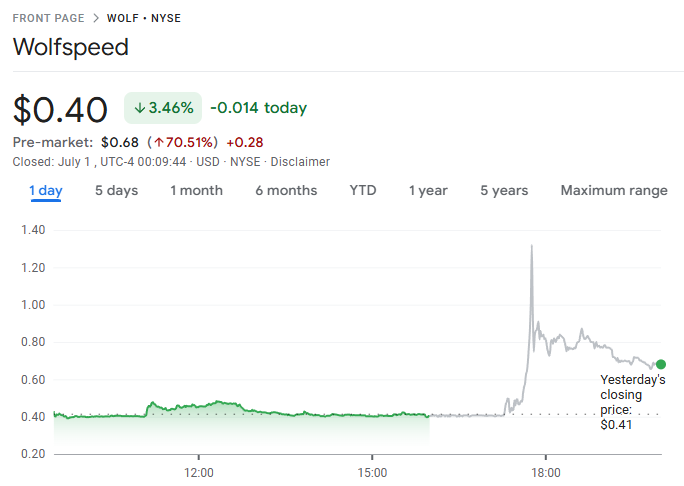SiC Leader Wolfspeed Files for Bankruptcy; Shares Soar 70.5% After-Hours
TradingKey - On Monday, Wolfspeed (WOLF.US), a silicon carbide semiconductor manufacturer that once held a market share of over 60%, voluntarily filed for Chapter 11 bankruptcy protection in the U.S. to restructure its debt. This marks one of the largest bankruptcy filings so far this year, second only to Brazilian airline Azul SA and satellite operator Ligado Networks.
Following the news, Wolfspeed's shares surged 70.5% in after-hours trading on Monday.

(Source: Google Finance)
Wolfspeed’s current predicament is largely due to its aggressive expansion strategy and unfavorable market conditions. The company has made significant investments in projects such as its New York 8-inch wafer fab and plants in Germany, resulting in a surge in capital expenditures.
Meanwhile, weak market demand, particularly delayed electric vehicle orders and intense price competition, has led to continuous losses for the company. Currently, Wolfspeed’s total debt amounts to as high as $6.5 billion, far exceeding its cash reserves of $1.33 billion.
Wolfspeed’s restructuring plan involves a bankruptcy process through which the company will reduce approximately 70% of its debt (around $4.6 billion), with annual interest expenses expected to drop by 60%. In addition, the company has secured a $275 million funding injection supported by creditors, including Apollo Global Management and Renesas Electronics. Notably, existing shareholder equity will be diluted to between 3% and 5%, while convertible bonds and loans from Renesas will be converted into new shares.
The market views this bankruptcy protection positively; on one hand, Wolfspeed is adopting a “pre-packaged” bankruptcy model where creditors have reached agreements beforehand, reducing uncertainty; the market sees this as a key step for the company to shed its debt burdens and restart growth. On the other hand, despite substantial dilution of equity, existing shareholders can still retain 3%-5% ownership, better than the anticipated risk of being completely wiped out.
The company emphasizes that the restructuring will not affect normal operations; customer collaboration and employee compensation will remain stable.



